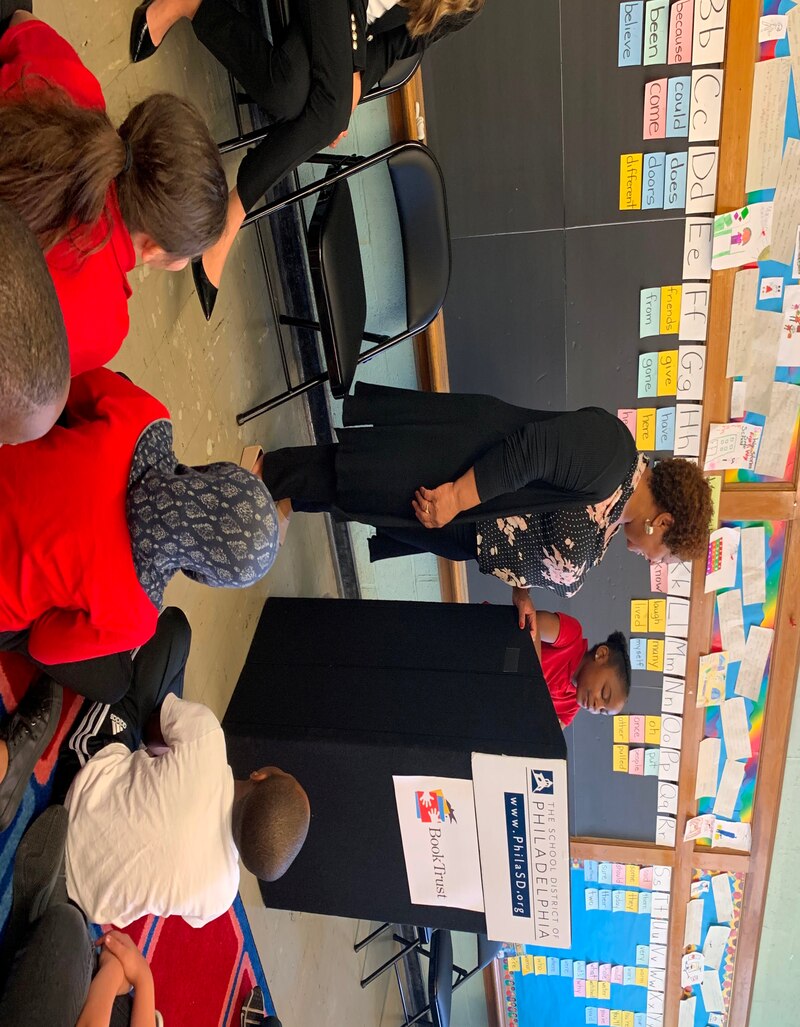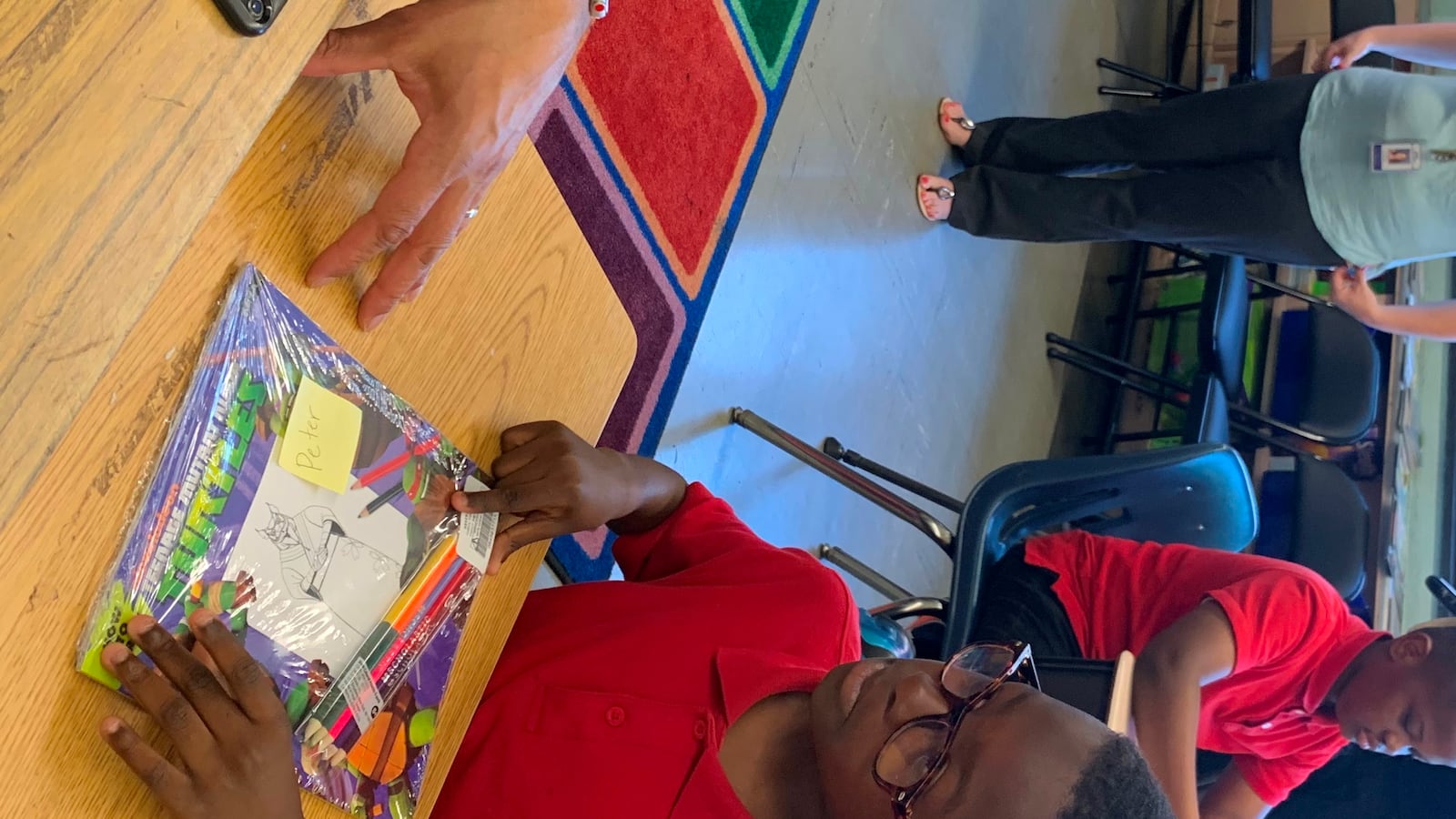This article was originally published in The Notebook. In August 2020, The Notebook became Chalkbeat Philadelphia.
Shelly Alston said that her granddaughter Jewel is always reading.
When she brings Jewel to the gym and works out, the girl sits on the side reading a book. In the back seat of the car, Jewel reads a book, Alston told the gathering at Spruance Elementary School, where she teaches 5th grade.
“Her love of reading has really grown,” Alston said of her granddaughter, a 3rd grader in Barbara Kennedy’s class at Spruance, in Northeast Philadelphia.
Jewel wasn’t an avid reader until a program came along at Spruance called BookTrust, a national nonprofit that, along with local philanthropies, provides up to three books a month to kindergarten through 3rd-grade students.
The key: The children can pick out the books themselves, depending on what they’re interested in.
“BookTrust made me a better reader by showing me all the choices out there,” Jewel said solemnly, her head barely reaching above the lectern set up for the adults. Her favorites: the Black Lagoon adventure series.
BookTrust, which was started in Colorado in 2001 by the Schatz family, has since spread to 21 states, reaching 57,000 children.
Superintendent William Hite and officials from BookTrust traveled to Spruance on Monday to announce that Philadelphia’s pilot program of 10 schools would be expanded to include all elementary schools in the District within four years, a step made possible by a $1.3 million grant from the William Penn Foundation.
Philadelphia is the first city to go districtwide with the program, said Tiffany Kuehner, president and CEO of BookTrust. She and Kristy Adams, the organization’s senior director of philanthropy, flew from Denver on Monday morning to attend the announcement event.

Jewel, with her grandmother Shelly Alston, explains how BookTrust nurtured her love of reading. Alston is a 5th-grade teacher at the school.
Kuehner asked the students to guess how many books the children at Spruance had received so far. Estimates ranged from “more than a thousand” to “gazillion billion.” The answer: At Spruance, a pilot school, 644 students have received 11,663 books.
BookTrust’s goal is to close a gap between low-income and more affluent communities. The organization cites research showing that in poorer communities, there is just one book for every 300 children, while in middle-income households, the average is 13 books per child.
Hite said the program fits well into the District’s early literacy initiatives. One of his “anchor goals” is for all students to leave the 3rd grade reading on grade level. Research has shown that children who reach that milestone have a much better chance of graduating from high school and moving on to secondary education.
Although there has been considerable progress in the last few years, more than half the city’s students still don’t reach that goal.
Elliot Weinbaum of the William Penn Foundation said that one goal is to create lifelong readers.
“We want all students to have a love of reading,” he said. At the end of the four years, the program will reach 150 elementary schools and 43,000 students in 2,000 K-3 classrooms. The program also includes resources for teachers.
“In a system of this size, every school and every teacher needs effective practices,” he said.
As part of the program, students take books home to create personal libraries that supplement those in their classrooms, which have been assembled as part of the city’s Read by 4th initiative, also supported by the William Penn Foundation.
Teachers and instructional leaders at Spruance heaped praise on the program.
“It’s amazing what an opportunity this is,” said Barbara Kennedy, as her students lined up to receive their books for the month of June. “It’s more than just giving them a love of reading.”
She explains that it sharpens their thinking skills because every month each child gets a “budget,” and they have to make decisions about what books they want based on how much there is to spend. And she said she also likes how the students express generosity. “They’ll say, ‘I want to get this for my little brother or sister.'”
Kierra Cooper picked a book about two best friends because it came with a little bracelet. “I can give it to my friend,” she explained.
Peter Ayodele picked a coloring book about Ninja Turtles, “because you get to color, and it also teaches you how to draw Ninja Turtles. And my sister’s an artist,” he explained earnestly.

